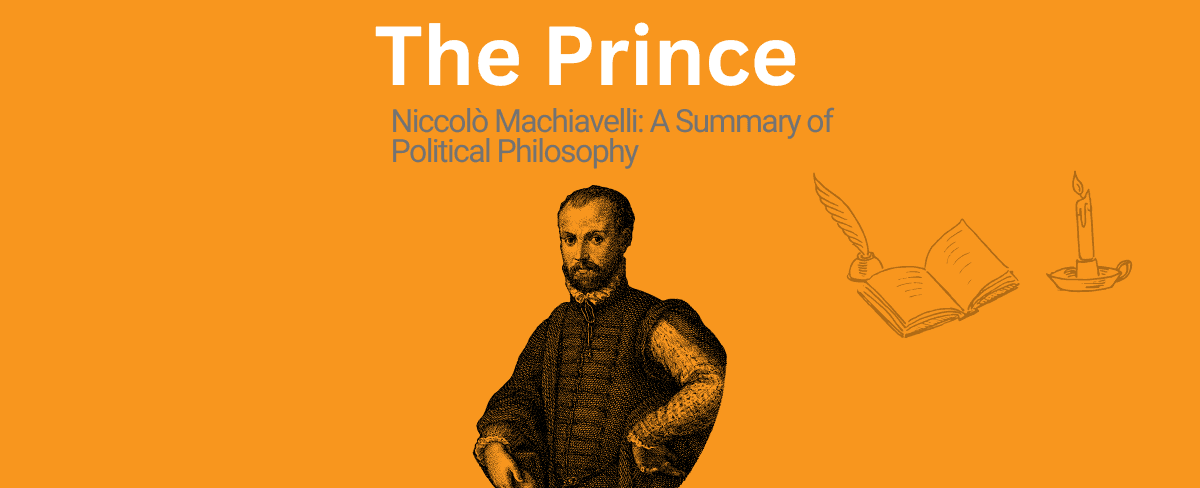
The Prince: A Summary of Niccolò Machiavelli's Book

Niccolò Machiavelli was an Italian philosopher, politician, and writer who lived during the Renaissance era. He is best known for his book “The Prince”, which is considered one of the most important works in political philosophy. “The Prince” was written in 1513 and was dedicated to Lorenzo de’ Medici, who was a member of the powerful Medici family in Florence.
“The Prince” is a treatise on political power and leadership, and it provides a guide for rulers on how to gain and maintain political power. The book is important in political philosophy because it is one of the first works to separate morality from politics and to argue that the ends justify the means. Machiavelli’s ideas in “The Prince” were controversial at the time and continue to be debated by scholars today.
Historical Context
Italy during the Renaissance Political instability and the need for strong leadership Machiavelli’s experiences as a diplomat and government official
Machiavelli lived in Italy during a time of great political instability. The Italian city-states were constantly at war with each other, and foreign powers such as France and Spain were vying for control of the region. Machiavelli witnessed first hand the chaos and violence of this period and believed that strong leadership was necessary to restore order.
Machiavelli himself served as a diplomat and government official for the Florentine Republic. He was involved in many important diplomatic missions, including those to France and the Holy Roman Empire. However, he was eventually dismissed from his position and arrested on charges of conspiracy against the Medici family, who had come to power in Florence. It was during his exile from politics that Machiavelli wrote “The Prince”.
Main Ideas of “The Prince”
“The Prince” is a complex work with multiple themes, but these are the main ideas that Machiavelli explores:
- Definition of a prince and his main goals: According to Machiavelli, a prince is someone who has acquired political power through hereditary means or by conquest. The main goal of a prince is to maintain his power and protect his state, even if it means using force and cunning tactics.
- The importance of maintaining power and stability: Machiavelli argues that a prince must do whatever it takes to maintain his power and the stability of his state. He believes that stability is essential for prosperity, and that the ruler must be willing to use force or deceitful tactics to achieve it.
- The use of force and cunning to achieve political goals: Machiavelli believes that a prince must be willing to use force when necessary and to be cunning in his tactics. He argues that it is better to be feared than loved, and that a prince should not be afraid to be seen as cruel or unjust if it is necessary to maintain his power.
- The idea of the ends justifying the means: Machiavelli famously argues that the ends justify the means, meaning that a prince should do whatever it takes to achieve his political goals, even if this means using immoral or unethical tactics. He believes that a ruler’s success is measured by the outcomes he achieves, not by the means he uses to achieve them.
- The role of fortune in political success: Machiavelli acknowledges that fortune (luck) plays a role in political success, but he also believes that a prince can use his intelligence and cunning to overcome bad fortune and maintain his power. He encourages rulers to be proactive and to take control of their destiny rather than relying on luck.
Machiavelli’s ideas in “The Prince” emphasize the importance of strong leadership and the need for rulers to take bold actions to achieve their goals. His ideas have been controversial and have sparked much debate, but they have also influenced political philosophy and shaped our understanding of power and leadership.
Analysis of “The Prince”
- Criticisms and controversies surrounding the book: “The Prince” has been the subject of much criticism and controversy since its publication. Some have accused Machiavelli of promoting immoral and unethical behavior, while others have criticized his ideas as being overly cynical and harsh. The book has been banned in some countries, and its reputation has been tarnished by its association with authoritarian rulers throughout history.
- Machiavelli’s intentions and audience: There is much debate over Machiavelli’s intentions in writing “The Prince.” Some scholars argue that he was trying to provide practical advice to rulers, while others believe that he was using the book as a means of critiquing the political climate of his time. It is also unclear who Machiavelli’s intended audience was, as the book was written in a language that was not commonly used among Italian rulers at the time.
- The relevance of “The Prince” in modern politics: Despite its controversial reputation, “The Prince” remains relevant in modern politics. Machiavelli’s emphasis on the importance of strong leadership and the need for rulers to take bold actions to achieve their goals continues to shape our understanding of power and leadership. However, many of his ideas are no longer considered acceptable in modern society, and his endorsement of unethical behavior is often criticized.
“The Prince” is a complex and controversial work that has influenced political philosophy for centuries. While its ideas are still relevant in modern politics, they must be understood in their historical context and considered in light of contemporary ethical standards.
Final Thoughts
“The Prince” by Niccolò Machiavelli is a significant work in political philosophy that explores the nature of power, the role of the ruler, and the use of force and cunning in achieving political goals. Machiavelli argues that a ruler must be willing to take bold actions and use any means necessary to maintain power and stability, even if it means being viewed as cruel or unjust. His ideas have been controversial and have sparked much debate, but they have also influenced political philosophy and shaped our understanding of power and leadership.
Machiavelli’s legacy in political philosophy is complex, as his ideas have been both praised and criticized. On the one hand, he is admired for his emphasis on strong leadership and the importance of taking bold actions to achieve political goals. On the other hand, his endorsement of unethical behavior has been widely condemned, and his ideas have been associated with authoritarianism and tyranny.
Machiavelli’s impact on political philosophy cannot be denied. “The Prince” remains a classic work that continues to shape our understanding of power, leadership, and politics. While his ideas may not always be palatable or ethical, they are thought-provoking and continue to generate debate and discussion.
Tags
Related Posts




Quick Links
Categories


